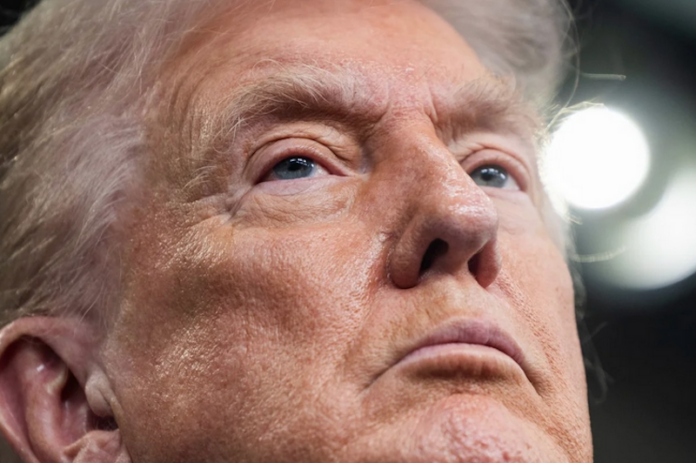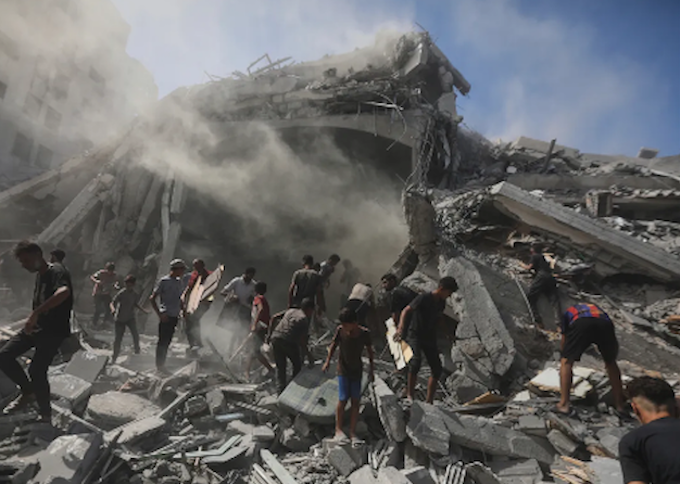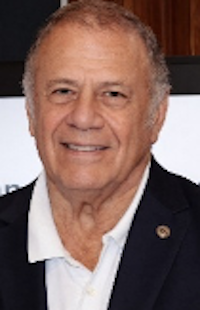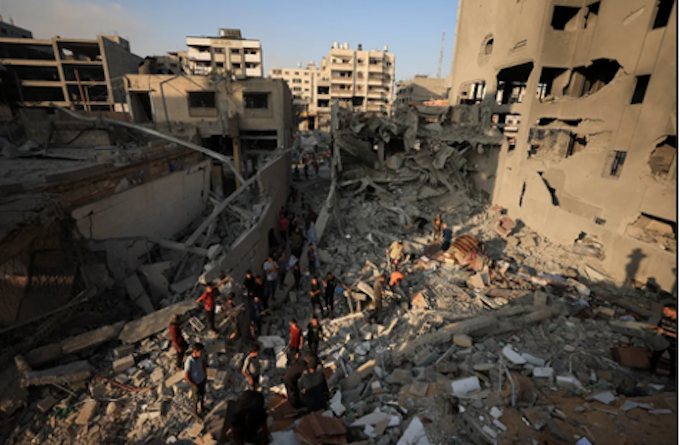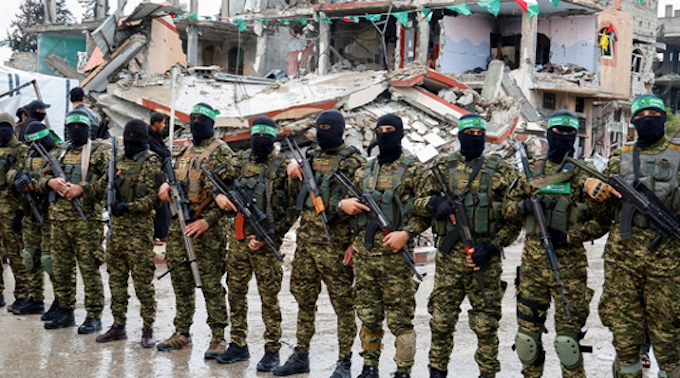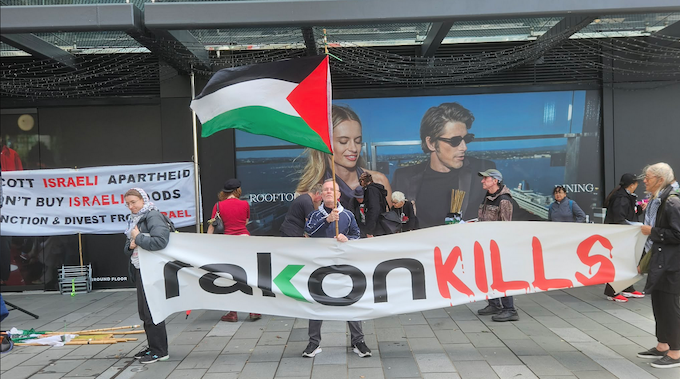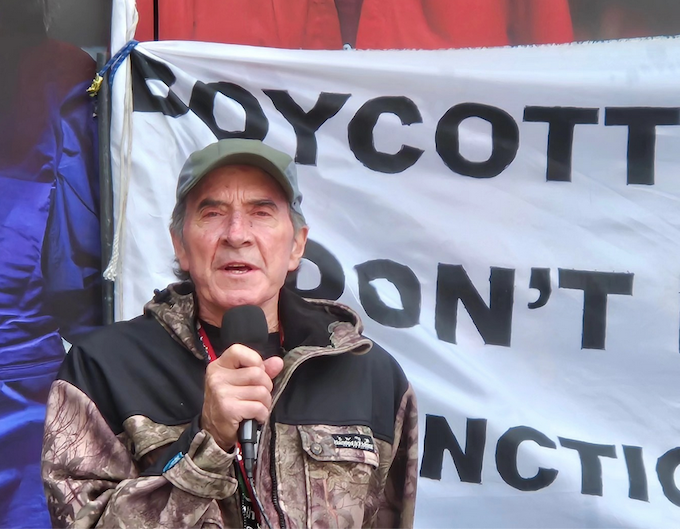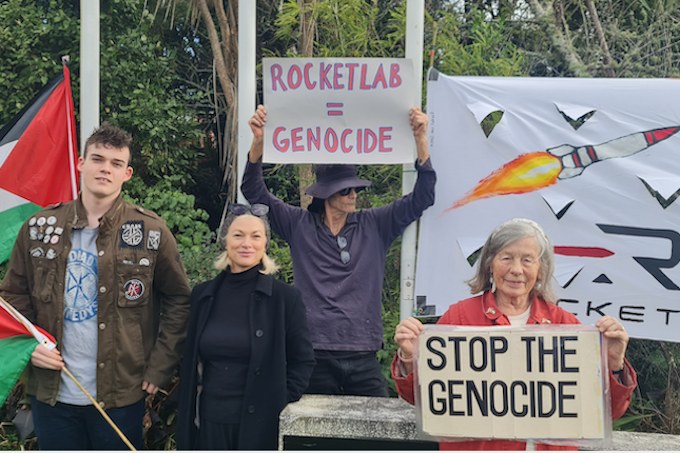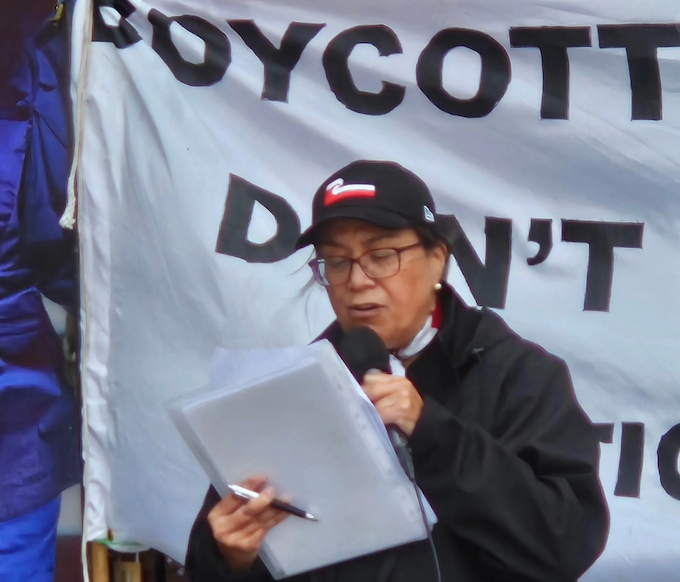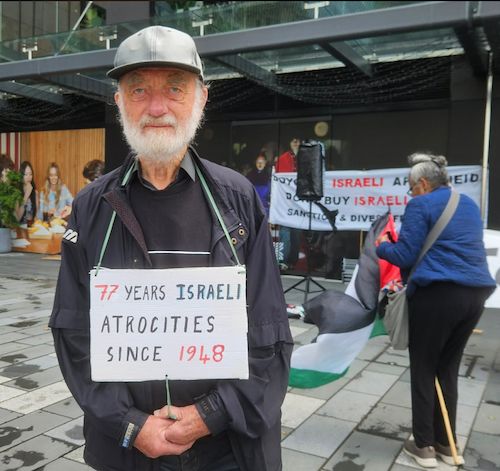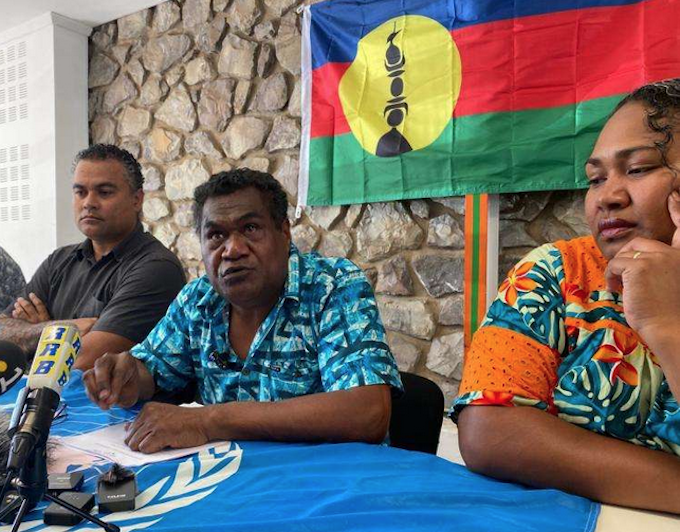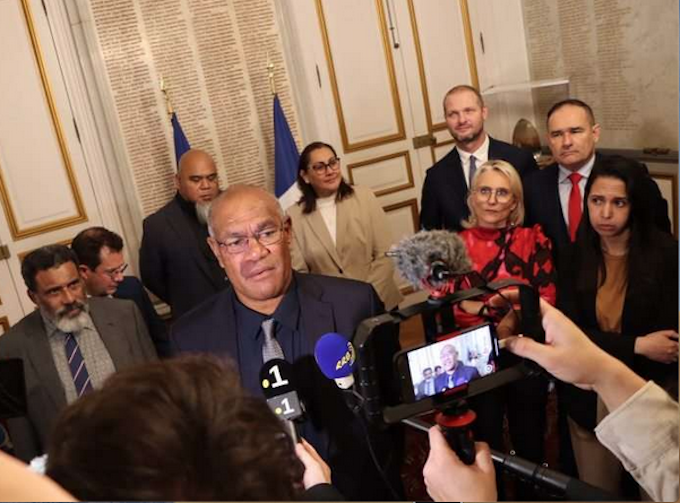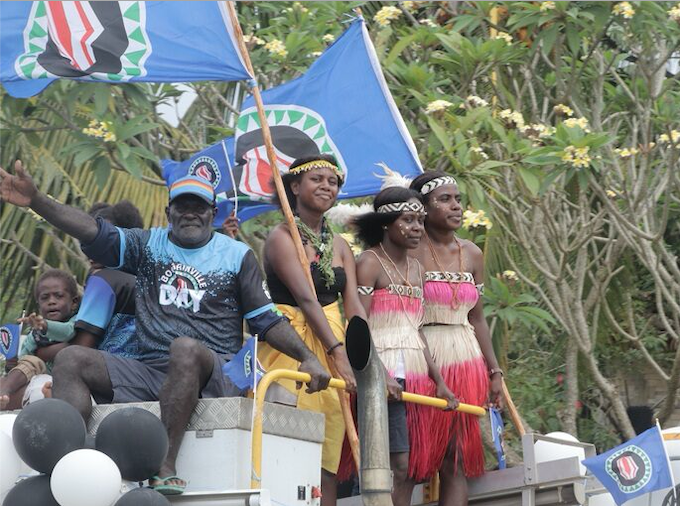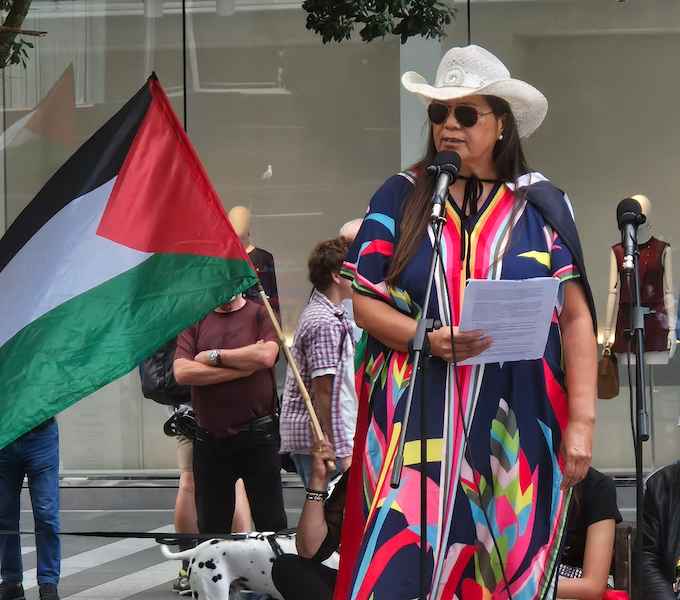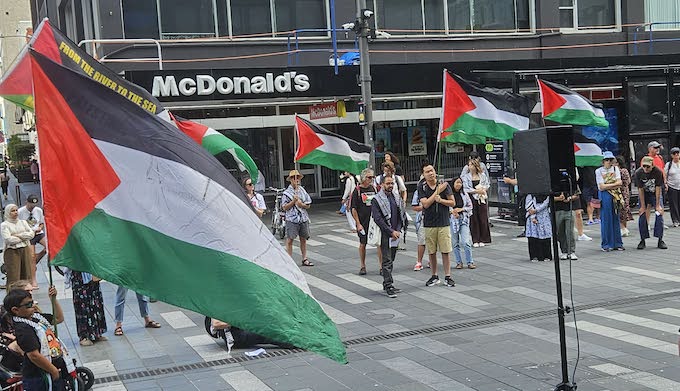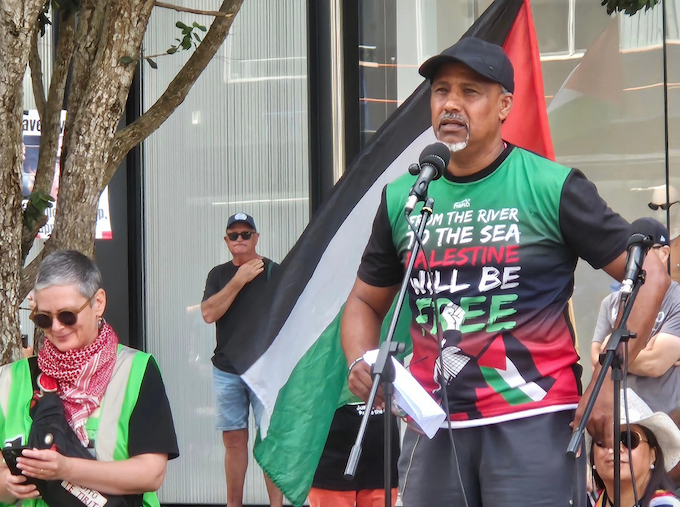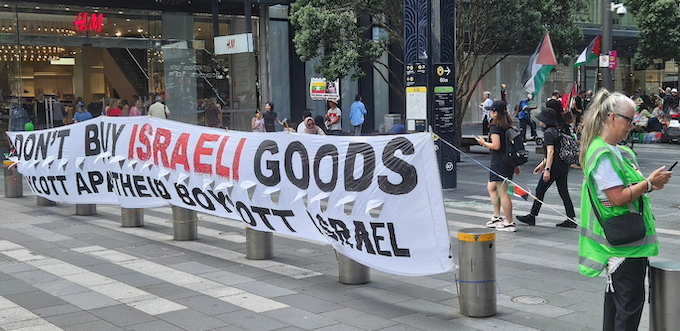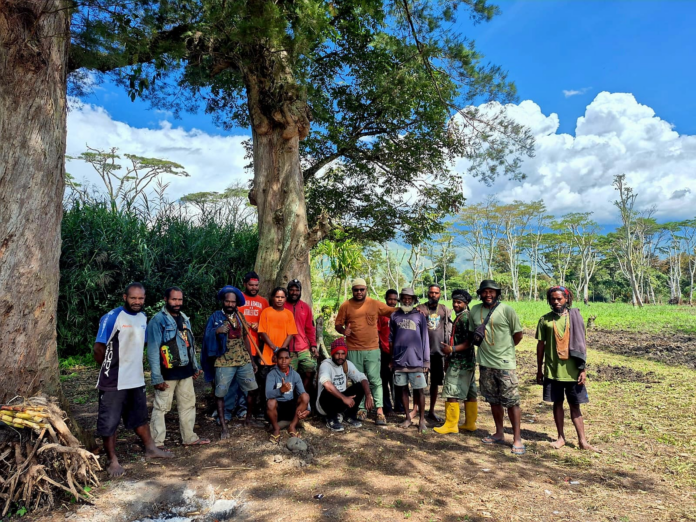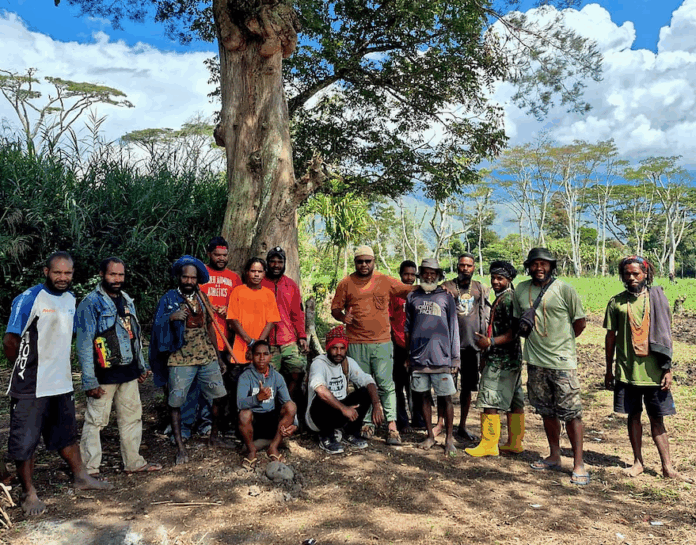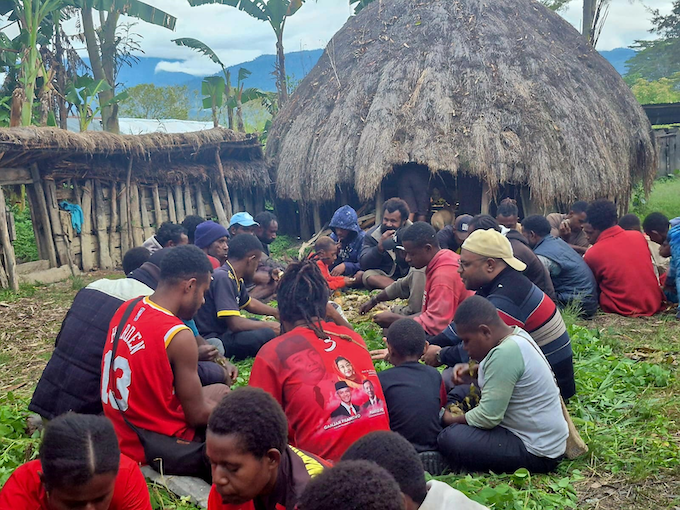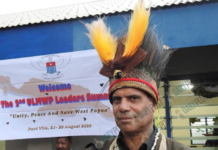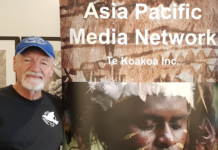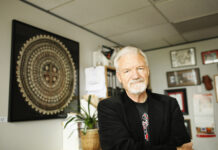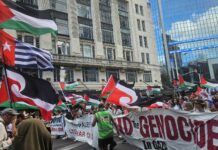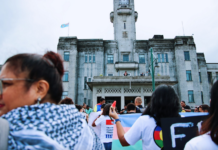Feckless European leaders like Starmer let Israel and the US tear up international law in Gaza. Now, faced with Greenland and Ukraine, they are suffering from a severe case of buyer’s regret.
ANALYSIS: By Jonathan Cook
US President Donald Trump has declared the three-month “ceasefire” in Gaza a great success, and now wants to move on to phase two of his so-called “peace plan”.
What does success look like? Israeli soldiers have killed more than 460 Palestinians since October, including at least 100 children.
Israel has levelled another 2500 buildings, the last of the few that were still standing.
And amid a continuing humanitarian catastrophe engineered by Israel through its blockade of food, water, medicines and shelter, at least eight babies are known to have frozen to death as winter temperatures plummet.
Marking the transition to the new phase, Trump announced earlier this month a “Board of Peace” to determine the enclave’s future.
“Peace” here is being used in exactly the same Orwellian sense as “ceasefire”. This is not about ending Gaza’s suffering. It is about creating Big Brother-style narrative control, selling as “peace” the final eradication of Palestinian life in Gaza.
The narrative spin is that, once Hamas is disarmed, the board will take on the job of Gaza’s reconstruction.
Implicit assumption
The implicit assumption is that life will gradually return to normal for the survivors of the two-year genocide Israel has carried out — though no Western leader is acknowledging it as a genocide, or cares to find out how many Palestinians have actually been killed in the onslaught.
But, as we shall see, peace is definitely not what the board is aiming to achieve. This is a cynical exercise in smoke and mirrors.
The term “board” hints not only at Trump’s preference for the language of business over politics. It alludes too to the business opportunities he intends to make from Gaza’s “transformation”.
His plan is to strip the United Nations — and thereby the international community — of any oversight of Gaza’s fate.
We are back to the time of viceroys. Colonialism is again out and proud.
Trump’s “Board of Peace” has much grander ambitions than simply managing Gaza’s takeover. In fact, the enclave and its future is not even mentioned in the board’s so-called “charter” sent out to national capitals.
In a leaked invitation to the president of Argentina, Trump referred to the board as a “bold new approach to resolving global conflicts”.
‘Results-orientated’
The charter says it will be “results-orientated” and have the “the courage to depart from approaches and institutions that have too often failed”.
Some of us have long warned that Israel and the US view the Palestinians as lab rats, both for testing weapons and surveillance technologies and for changing the norms developed after the Second World War to safeguard against the return of fascist, militaristic and expansionist ideologies.
The critical legal and humanitarian architecture put in place in the post-war era included the UN and its various institutions, including the International Court of Justice (ICJ) and the International Criminal Court (ICC).
Israel and the US stress-tested this system to destruction from the very start of the two-year genocide in Gaza, as Israel carpet-bombed the enclave’s homes, schools, hospitals, government buildings and bakeries.
Trump’s second presidency has pushed this agenda into overdrive.
Only this month the White House announced that the US was pulling out of 66 global organisations and treaties — some half of them affiliated with the UN.
Meanwhile, the judges and prosecutors of the ICC have been under draconian US sanctions for issuing an arrest warrant for Israeli Prime Minister Benjamin Netanyahu and his former defence minister, Yoav Gallant. The ICJ, which is investigating Israel for genocide, appears to have been cowed into silence.
Dysfunctional world order
Trump’s kidnapping of Venezuela’s President Nicolas Maduro and his imminent seizure of Greenland are evidence enough that the already dysfunctional, international “rules-based order” is now in tatters. Both the UN and Nato, the West’s so-called “defence” alliance, are on the ropes.
The US president hopes his “Board of Peace” will deliver the knockout blow, supplanting the UN and the system of international law it is there to uphold.
The reconstruction of Gaza may be its first task, but Trump has much larger aspirations.
The board stands at the heart of a new world order being shaped in Trump’s image. Billionaires and their hangers-on will openly decide the fate of weak nations, based on the power elite’s naked, predatory instincts to make money.
In a petulant letter sent to Norway’s prime minister, Trump advised that, after being passed over for the Nobel peace prize: “I no longer feel an obligation to think purely of Peace.” What in that case, one might wonder, is the point of a “Board of Peace”?
The answer is that Orwell’s moment is truly upon us: “War is peace.”
Trump, of course, has sat himself atop this new imperial business venture, an updated East India Company — the gargantuan, militarised corporation licensed by England’s Queen Elizabeth I that went on to pillage much of the globe for more than two centuries, spreading death and misery in its wake.
Trump’s lone veto
As chairman, Trump hand-picks the other members — he is reported to have sent out invitations to some 60 national leaders. He can terminate their participation whenever he sees fit. He decides when the board sits and what it discusses. He alone has a veto.
His term as chair, it seems, may extend even beyond his time as US president.
Members are granted a three-year term. A permanent seat at Trump’s new alternative to the UN Security Council can be bought for $1 billion in “cash funds”.
Hungary’s far-right leader Viktor Orban was among the first out of the blocks. He was joined by Netanyahu. Other early participants include the United Arab Emirates, Vietnam, Uzbekistan, Kazakhstan, Morocco, Belarus and Argentina.
Russia’s Vladimir Putin is reported to be considering a place at the top table.
The significance of this is not lost on the diplomatic community. One told Reuters: “It’s a ‘Trump United Nations’ that ignores the fundamentals of the UN charter.”
Similarly, in a desperate attempt to hold the line, the French Foreign Ministry issued a forlorn statement that “reiterates [France’s] attachment to the United Nations charter”.
White House shredder
But the founding UN document, with its formal commitments to non-aggression, self-determination, multilateral obligations and the protection of human rights, has been put through the White House shredder.
Gangsters have no time for rules.
For decades, Israel has been dreaming of this moment: of taking a wrecking ball to the UN and its legal and humanitarian institutions.
With a record number of UN resolutions against it, Israel believes the world body has too often limited its room for manoeuvre. Now it will hope Trump frees it to finish its long-cherished plan of eradicating the Palestinian people from their homeland.
As if in celebration, Israeli bulldozers swept into occupied East Jerusalem to demolish the buildings of Unrwa, the UN refugee agency that has served as the main aid lifeline for Gaza’s people.
Unrwa called Israel’s action an “unprecedented attack” and one that “constitutes a serious violation of international law and the privileges and immunities of the United Nations”.
Don’t hold your breath waiting for the “Board of Peace” to raise any objections.
Sidelining of UN
Trump’s sidelining of the UN means its assessments of the realities facing Gaza, after Israel’s two-year campaign of genocidal destruction, can be quietly shunted into the shadows.
Trump has set a five-year timeline for Gaza’s transition. But the figures simply don’t add up.
The world body has warned that, even if Israel stops its blockade tomorrow, it will take decades to reconstruct Gaza, effectively from scratch, to house those of its 2.1 million inhabitants who survive.
According to estimates from the UN Development Programme, on the best-case scenario it could take seven years to clear some 60 million tonnes of rubble. Other surveys by the UN suggest a more realistic timetable of 20 years, with 10 years to clear unexploded ordnance.
The UN’s trade and development arm further warns that Israel has erased 70 years of human development in Gaza, and destroyed nearly 90 percent of cropland, leading to “the worst economic collapse ever recorded”.
Gaza’s schools, universities, hospitals, libraries and government offices are all gone. And Israel’s so-called “Yellow Line” that divides Gaza into two has annexed in all but name almost 60 percent of what was already a tiny territory, one of the most densely populated on the planet.
The fact is that these enormous hurdles to restoring life in Gaza to anything approximating “modernity” barely register in Trump’s peace plan. There is a good reason for that: strip away the fanfare and the plan has nothing substantive to say about the welfare of Gaza’s population.
Gaza’s population ignored
Or to put it more bluntly, Trump’s Gaza’s plan is not interested in Gaza’s population because it does not envision them being present in the enclave for much longer.
Israel’s barely veiled goal over the past two years has been the wholesale ethnic cleansing of Gaza. The carpet bombing was intended to make the territory entirely uninhabitable.
Trump’s plan does not conflict with that ambition. It complements it. His “Board of Peace” is the means to arrive at the final destination willed by Israel.
The first practical function of the “Board of Peace” will be to entrench the complicity of Western and Arab states in Israel’s eradication of Gaza. None can wriggle out of their responsibility for what follows.
Real decision-making powers, however, will reside not in the Board but in an executive body comprising seven figures close to Trump. The “Board of Peace” will presumably be expected to sign off on — and fund — whatever they decide.
This “Founding Executive Board”, like the “Board of Peace”, will have no Palestinian representatives.
Instead, Palestinians will be present only on a technocratic, dogsbody committee, called the National Committee for the Administration of Gaza. It will oversee the administration of day-to-day affairs in the so-called Red Zone, where Gaza’s people are penned up, in place of Hamas.
Revamped UN peacekeeping force
Finally an “International Stabilisation Force”, a revamped UN peacekeeping force, will be led by a US major-general, and presumably partner closely with Israel’s genocidal army.
Even assuming that Trump has the Palestinians’ welfare at heart — he doesn’t — no progress can be made by any of these bodies until Israel gives its approval.
In the meantime, their role will be to provide a veneer of legitimacy for further inaction, while more of Gaza’s survivors die from the Stone Age conditions engineered for them by Israel.
Note well the three real power brokers appointed to the “Founding Executive Board”: Jared Kushner, Steve Witkoff and Tony Blair. Gaza’s fate is effectively in their hands.
It was Jared Kushner, Trump’s son-in-law and scion of a real estate business family, who way back in February 2024 — long before Trump took office — framed Israel’s genocide in Gaza as “a real-estate dispute”.
It was then that Kushner first publicly floated the idea of developing the enclave into a “very valuable” waterfront property, once it had been “cleaned up”.
Steve Witkoff, a New York real estate mogul and Trump’s special envoy, has spent long months with Kushner — as Israel has been busy clearing out Old Gaza — working on a 40-page prospectus for their proposed New Gaza.
Kushner’s panic
In October, on the US TV news show 60 Minutes, panic was etched on Kushner’s face as Witkoff observed that the pair had been working on a “masterplan” for Gaza’s reconstruction for two years — long before Gaza was levelled by the Israeli military.
He added: “Jared has been pushing this.”
Witkoff’s slip suggested Trump’s team had known from the outset of Israel’s bombing campaign that the intention was to eradicate the whole of Gaza rather than just Hamas. They therefore began working on a business plan to cash in on the carnage.
Through a so-called GREAT Trust — an oh-so-clever acronym for Gaza Reconstitution, Economic Acceleration and Transformation — they have reimagined the enclave as a glitzy seaside resort and a tech hub generating billions of dollars in annual revenue.
A surreal video Trump posted on social media nearly a year ago gave an early idea of what the pair may have in mind. It showed the US president and Netanyahu sipping cocktails on sun loungers in their swimwear amid high rises on Gaza’s ethnically cleansed beachfront.
Gaza’s population — impoverished and malnourished by decades of isolation and blockade, even before the genocide — is viewed as an obstacle to the plan’s realisation.
The enclave’s Palestinians must first be resettled elsewhere, on terms that are as yet unclear, seemingly even to the plan’s formulators.
Misleading Tony Blair
Also popping up on the Executive Board, like a bad penny, is Tony Blair, the former British prime minister who misled Parliament and the public to make the case for joining President George W Bush’s illegal invasion of Iraq in 2003.
A subsequent, long, violent US-led occupation resulted in the collapse of Iraqi society, a vicious sectarian civil war, the development of an extensive US torture programme, and the deaths of more than a million Iraqis.
Those seem like exactly the kind of qualifications Trump needs from someone overseeing his Gaza plan.
His administration is therefore selling Blair as a safe pair of hands, a statesman apparently well-acquainted with navigating the yawning gap between the imperious demands of Israel and the forlorn hopes of the Palestinian leadership.
Blair’s skill set, we are assured, will be critically important as the board turns its attention to rebuilding Gaza.
In fact, the last person Gaza needs is Blair, as he proved during his disastrous eight-year stint as special envoy to the Middle East, shoe-horned in by the US in 2007 on behalf of a little-missed, defunct international body known as the Quartet.
At the time, most observers mistakenly assumed Blair’s mandate would be to revive a moribund “peace process” between Israel and the Palestinians.
Diplomatic pressure avoided
But Blair avoided bringing any diplomatic pressure to bear on Israel and remained silent about what was then a newly instituted blockade of Gaza in 2007 that rapidly eviscerated its economy and left much of its population destitute and poorly fed.
One of his key battles as envoy was lobbying Israel — over the Palestinians’ heads — to let a British-led consortium drill for natural gas in Gaza’s territorial waters, where large reserves are known to exist.
According to reports, he sought to entice Israel into approving a $6 billion deal by promising that the pipeline would head directly to Israel’s port of Ashkelon. Israel would be the only customer permitted to buy the Palestinians’ gas and could therefore dictate the price.
Israel, preferring to maintain its chokehold on Gaza’s people, refused.
Blair claimed he promoted the Gaza gas project at the behest of the Palestinians. But even the supine Palestinian leadership of the Palestinian Authority, based in the West Bank, had no love for him.
In 2011, Nabil Shaath, then one of Palestinian leader Mahmoud Abbas’ most trusted advisers, observed of Blair: “Lately, he talks like an Israeli diplomat, selling their policies. Therefore he is useless to us.”
Another official called him “an obstacle to the realisation of Palestinian statehood”.
No interest in Palestinians
Like Blair, Trump has no interest in the Palestinians ever benefiting from their own resources. But doubtless he will be keen to leverage the former UK prime minister’s “experience” as envoy to assist in plundering its gas fields.
The centrality of Israel to Blair’s moral worldview was underscored in a comment by him in 2011 about the Arab Spring, in which peoples across the Middle East tried to liberate themselves from the toxic grip of tyrants. The former British prime minister chiefly saw these democratic uprisings as likely to “pose a problem for Israel”.
Blair has denied any personal dealings with Kushner and Witkoff’s Gaza Riviera plan — now sometimes referred to as the Sunshine Project — of luxury beachfront resorts and a “smart manufacturing zone” named for billionaire Elon Musk.
But a version leaked last July suggests his fingerprints are all over the plan, including a proposed “voluntary relocation” scheme to buy out Palestinian landowners with minor sums to leave Gaza.
It emerged that two key members of his think tank, the Tony Blair Institute for Global Change, had been liaising behind the scenes with Israeli businessmen and the Boston Consulting Group on the project.
A statement from the institute welcomed Blair’s role on Trump’s Executive Board, noting: “For Gaza and its people, we want a Gaza which does not reconstruct Gaza as it was but as it could and should be.”
It is hard to believe that Blair’s “should” connotes anything other than Israel’s dream of a Palestinian-free Gaza and Trump’s vision of Gaza as a playground for the rich.
Trumpian world template
The template for a new Trumpian world order is being crafted in Gaza. The US president’s road to the takeover of Venezuela and Greenland is being paved in this tiny Palestinian territory.
Feckless European leaders, like Britain’s Keir Starmer, who helped arm Israel and provided it with diplomatic cover as it levelled the enclave, were the ones who emboldened Trump.
Those now trying to assert the primacy of international law and the “rules-based world order” — whether in Greenland or Ukraine — were the ones who helped Washington destroy that order. They are now suffering from a severe case of buyer’s regret.
They could still stymie Trump’s latest, sinister vanity project by refusing to join the “Board of Peace” and instead defend the United Nations and its legal institutions like the International Court of Justice and the International Criminal Court.
Will they do so? Don’t bet on it.
Jonathan Cook is a writer, journalist and self-appointed media critic and author of many books about Palestine. Winner of the Martha Gellhorn Special Prize for Journalism. Republished from the author’s blog with permission. This article was first published by Middle East Eye.


